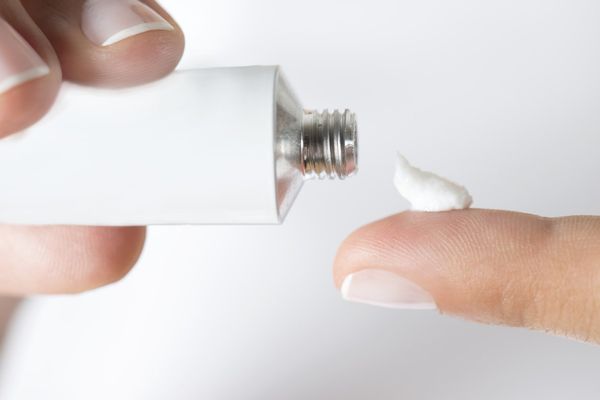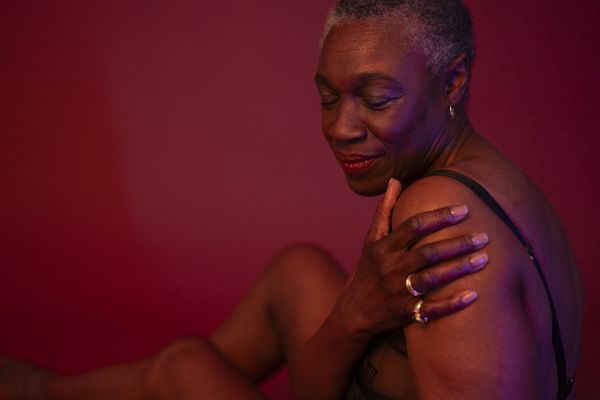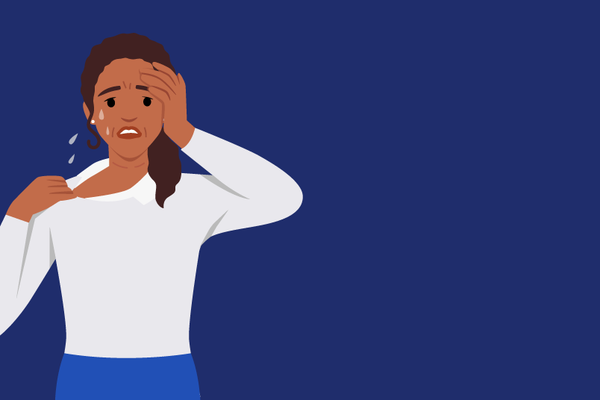Menopause—and the years before and after it—bring a number of symptoms that may include problems sleeping, urinary complaints, sexual dysfunction, mood changes and, perhaps the most noticeable, hot flashes. Oddly enough, hot flashes can hit even on a cold winter day, and they can seem worse when you're sweating under a heavy coat while it's freezing outside.
Here are some tips for bundling up and cooling down:
- Dress in layers instead of wearing a bulky wool sweater or heavy turtleneck. This way, you can peel off layers as you need to.
- Keep some cold water nearby and take a drink when you feel a hot flash coming on.
- Identify your triggers. When you first start getting hot flashes, keep a record of when they occur and what you were eating, doing or feeling at the time. This way, you can analyze trends and try to eliminate these stimulations.
- Avoid common triggers. Common triggers include alcohol, caffeine, diet pills, spicy and hot foods and smoking. Stress and anxiety also may trigger hot flashes.
- Try relaxation techniques. For hot flashes triggered by stress or anxiety, sometimes it helps just to take a deep breath and a sip of cold water. You may also want to try relaxation techniques, such as deep breathing, meditation, massage, hypnosis or yoga.
- If night sweats are a problem, take a tepid or cool shower before bedtime, keep the temperature in your bedroom cool at night and don't pile on too many covers.
- Exercise regularly. Not only is physical activity great for the body, but it may help keep hot flashes at bay or reduce the intensity of hot sensations.
Knowing the signs and causes of hot flashes may also help you better understand and cope with this stage of your life.
It's not a medical emergency—it's a hot flash
If you're not sure what a hot flash feels like, you've probably never had one. They are often described as sudden, intense, hot sensations in your face, neck and chest. A hot flash typically lasts about three to six minutes, although the sensation can last longer. They may disrupt sleep when they occur at night—known as night sweats.
Not all hot flashes are the same. Some women find that they are preceded or accompanied by an increased heart rate, sweating, nausea, dizziness, anxiety, headache, weakness or difficulty breathing. Some describe an "aura," or uneasy feeling, which takes place beforehand, alarming them that a hot flash is on the way.
Neurological response to aging
Hot flashes are the body's response to fluctuating hormone levels before, during and after menopause. Technically, menopause results when the ovaries no longer release eggs and decrease production of the sex hormones estrogen, progesterone and, to a lesser extent, androgen. It is said to have occurred when a woman has not had a period for 12 months.
But, fluctuating estrogen levels, which trigger hot flashes, can begin well before menopause during perimenopause, a stage that typically lasts two to eight years.
Gradually during this time less estrogen circulates through the body. Although this isn't harmful, it signals to the hypothalamus—the section of the brain that produces hormones that regulate body temperature, hunger and moods—that the body is overheated. In response, the cardiovascular system pumps blood faster to get rid of the heat. The same mechanism occurs during the summer when you become hot.
Although hot flashes may take some getting used to, know that you're not alone. In fact, about 75 percent of women in the United States experience them as they approach menopause and for one to two years after, according to the American College of Obstetricians and Gynecologists. Some women will have hot flashes for a longer time, but the episodes generally decrease in intensity as time goes on.
Depending on the severity, your health care provider may prescribe medications to help alleviate symptoms.
- Could You Have Low Estrogen? ›
- 15 Minutes With: Ashley Winter, M.D., Talks Urology, Sex and All Things Vaginas ›
- Menopausal and Feeling Forgetful? Brain Fog Might Be to Blame ›
- The Surprising Signs of Perimenopause ›
- How to Tame a Hot Flash (No Hormones Required) ›
- From Hot Flashes to Night Sweats, a Rundown of Vasomotor Symptoms During Menopause - HealthyWomen ›
- Once Hot Flashes Fade, Are There Lasting Health Impacts? - HealthyWomen ›
- From Hot Flashes to Night Sweats, a Rundown of Vasomotor Symptoms During Menopause - HealthyWomen ›
- How Hot Flashes Affect Sleep - HealthyWomen ›
- Remedy for Irregular Periods and Hot Flashes - HealthyWomen ›
- Hot Flashes Getting You Down? Here's a Reason to Feel Up - HealthyWomen ›







